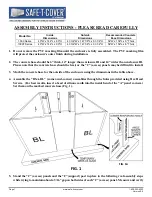
d) General
• The LED on the hard drive enclosure lights up when it is switched on (Power LED function),
or it
fl
ashes during read/write access.
• USB and 1394b-/FireWire 800 devices may be connected and disconnected when the com-
puter is running (with eSATA, only if the eSATA controller and its driver support “Hot Swap-
ping“).
You should, however, take into account that data may be corrupted, or the operating system
may crash, if the connection cable is disconnected while data is being transferred.
In Windows, an arrow symbol is usually displayed in the menu bar when the hard drive (or
other USB or 1394b/Firewire800 data media) is in use. Click on this arrow symbol to “remove”
the device, i.e. to terminate data transmission, so you can disconnect the connection cable
without risking the loss of data.
Disposal
Electrical and electronic products do not belong in the household waste!
Please dispose of the product, when it is no longer of use, according to the current
statutory requirements.
Technical Data
a) Hard drive enclosure
Connection .............................................USB 3.0, 1394b/FireWire 800 or eSATA
Suitable hard drive for installation ..........SATA, 8.89 cm/3.5”
Dimensions (W x H x D) .........................114.5 x 38 x 222 mm (without rubber feet)
Weight ....................................................660 g
b) Wall plug transformer
Operating voltage ...................................100 - 240 V/AC, 50-60 Hz
Output .....................................................12 V/DC, 2 A
These operating instructions are a publication by Conrad Electronic SE, Klaus-Conrad-Str. 1,
D-92240 Hirschau (www.conrad.com).
All rights including translation reserved. Reproduction by any method, e.g. photocopy, micro
fi
lming,
or the capture in electronic data processing systems require the prior written approval by the editor.
Reprinting, also in part, is prohibited.
These operating instructions represent the technical status at the time of printing. Changes in
technology and equipment reserved.
© Copyright 2012 by Conrad Electronic SE.
Handling
• Only use in dry indoor locations. The product must not get damp or wet! There is a
risk of a life-threatening electric shock!
• Never use the product immediately after it has been taken from a cold room to a
warm one. The condensation that forms might damage your unit. The wall plug
transformer also poses a risk for a potentially fatal electric shock!
Allow the product to reach room temperature, before connecting it to the power
supply and putting it into use. This may take several hours.
• Avoid the following adverse conditions at the installation location and during trans-
portation:
- Damp or excess air humidity
- Extreme cold (<5 °C) or heat (>35 °C); direct sunlight
-
Dust
or
fl
ammable gases, fumes or solvents
- Strong vibrations, impacts or blows,
-
Strong
magnetic
fi
elds such as those found close to machinery or loudspeakers
• Any maintenance or repair work may only be performed by an authorised repair
shop.
• When setting up the product, make sure that the cables are neither kinked nor
pinched.
• Do not move the product with a hard drive installed, when the latter is in use.
Movement during operation may cause the write/read heads in the hard drive to
make contact with the magnetic disk. This may not only lead to data loss but may
also damage the hard drive! The same applies to the 30-second period after the
hard drive enclosure has been switched off, until the magnetic disk in the hard
drive has come to a standstill.
Cleaning
Before cleaning the product, switch it off and unplug the wall plug transformer from the mains
socket. Then, wait for at least 30 seconds until the magnetic disks in the hard drive have come
to a complete stop.
Use a clean, dry, soft cloth for cleaning. Do not use aggressive cleaning agents as these
can cause discolouration. Do not press too strongly on the surface when cleaning, to prevent
scratch marks.
Dust can easily be removed using a clean, long-haired brush and a vacuum cleaner.
Tips & Notes
a) USB 3.0
• USB 3.0 devices are backwards compatible. This means that the hard drive enclosure, with
the SATA hard drive installed, also works with conventional USB 2.0 or slower USB 1.1 ports,
though only at the maximum USB 2.0 or USB 1.1. speed.
• Depending on the hard drive in your computer, and the hard drive installed in the enclosure,
as well as the motherboard used, USB 3.0 supports speeds that may exceed 100 MByte/s!
• For USB 3.0, the cable should be selected to be as short as possible to avoid a reduction in
the transfer speed.
• To connect the hard drive enclosure to a USB 3.0 port on your computer, you must use a USB
3.0 cable (e.g. the one enclosed).
If you use a conventional USB 2.0/1.1 cable, only the max. speed supported by USB 2.0/1.1
can be achieved and not the transmission speed supported by the USB 3.0 cable.
• If you want to connect the hard drive enclosure via a USB hub, the latter must also support
the USB 3.0 transfer mode in order to achieve the maximum speed.
b) 1394b/FireWire 800
• This interface provides a data transfer rate of approximately 800MBit/s (corresponds to
100 MByte/s).
• The two 1394b/FireWire 800 sockets on the rear of the hard drive enclosure are equivalent.
Therefore, it doesn’t matter which one you use.
The second socket is available for connecting, for example, an additional external hard drive.
c) eSATA
• When using the eSATA port, make sure that this supports so-called “hot swapping” (connec-
tion / disconnection during operation).
If this is not the case, then, sometimes, when connecting to a computer that is already run-
ning, the hard drive enclosure with its internal hard drive will not be detected.
Any disconnection during operation could lead to a loss of data.
• Both the hardware (the eSATA controller) and its driver must support “hot swapping”.
• Ii in doubt, you should disconnect the eSATA only after the computer has been switched off.


























